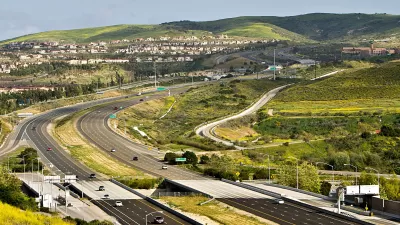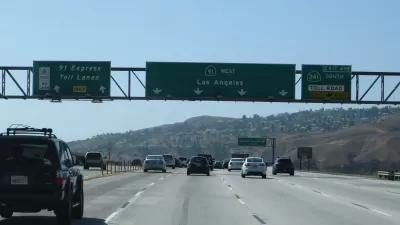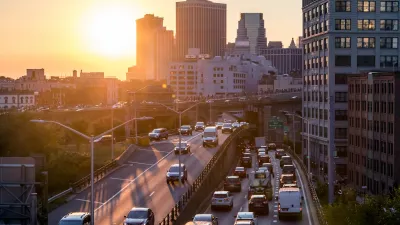Two southern CA toll roads are so severely underperforming that the state treasurer is investigating whether the bondholders can be paid their interest. The San Joaquin Hills toll road's bonds are rated at junk status. Widening I-5 & 405 didn't help.

Investors in privately-financed toll roads should first read what Dan Weikel has to write about the Transportation Corridor Agencies, "two joint powers authorities formed by the California legislature in 1986 to plan, finance, construct, and operate Orange County's toll roads" (per Wikipedia).
Orange County's great experiment in private toll roads, "touted as an innovative way to build public highways without taxpayer money", has instead shown why, perhaps, road-building should be left to the publicly-financed government sector as opposed to being financed by corporate bonds backed by tolls and development fees.
Weikel writes that "a government oversight panel chaired by state Treasurer Bill Lockyer has launched a formal inquiry into whether the roads can cover mounting interest payments to private investors who purchased tollway bonds."
"The roads, which rely on motorist tolls and fees from new developments in the area, have been battered by economic recessions, lower-than-expected population growth and competing public highways, such as Interstates 5 and 405, both of which have been widened and improved by Caltrans.
Wall Street ratings agencies have reduced the San Joaquin Hills toll road's bonds to junk status and the notes for the Foothill-Eastern corridor to the lowest investment grade."
- In 2011, ridership on the San Joaquin Hills, which has never performed as predicted, was only 43% of original forecasts, and its revenue was 61% of projections
- Motorists on the Foothill-Eastern last year numbered 33% less than projected, and revenue was 75% of forecasts
Despite the roads' sagging ridership, the agency has increased tolls repeatedly to keep pace with expenses and debt payments—at least 12 times since 1996 on the San Joaquin Hills alone.
The tolls on both corridors are now among the highest in the nation per mile. A round trip at peak travel times on the San Joaquin Hills costs $11, almost three times what it was in 1996."
Of course, another lesson may be that motorists are loath to drive on toll roads when alternative 'free roads', built, maintained, and even widened by the government are available.
To read more about how the history behind these roads, authorized by the state legislature, read the Transportation Corridor Agencies (TCA) 'about us' webpage.
Contributor's note: The TCA should not be confused with another private toll road company in California, the CPTC. From Caltrans webpage on SR 91 Express Lanes: This award winning project was developed in partnership with Caltrans by California Private Transportation Company (CPTC), an entity formed by subsidiaries of Peter Kiewit Sons', Inc., Compagnie Financiere et Industrielle des Autoroutes (Cofiroute), a French toll road company, and Granite Construction Inc.
FULL STORY: Orange County toll roads under review by California

Rethinking Redlining
For decades we have blamed 100-year-old maps for the patterns of spatial racial inequity that persist in American cities today. An esteemed researcher says: we’ve got it all wrong.

Montreal Mall to Become 6,000 Housing Units
Place Versailles will be transformed into a mixed-use complex over the next 25 years.

Planetizen Federal Action Tracker
A weekly monitor of how Trump’s orders and actions are impacting planners and planning in America.

Addressing Rural Homelessness in Kentucky
A Kentucky Lantern series focuses on the challenges unhoused Kentuckians face and efforts to provide support and assistance.

Santa Clara County Dedicates Over $28M to Affordable Housing
The county is funding over 600 new affordable housing units via revenue from a 2016 bond measure.

Why a Failed ‘Smart City’ Is Still Relevant
A Google-backed proposal to turn an underused section of Toronto waterfront into a tech hub holds relevant lessons about privacy and data.
Urban Design for Planners 1: Software Tools
This six-course series explores essential urban design concepts using open source software and equips planners with the tools they need to participate fully in the urban design process.
Planning for Universal Design
Learn the tools for implementing Universal Design in planning regulations.
City of Camden Redevelopment Agency
City of Astoria
Transportation Research & Education Center (TREC) at Portland State University
Regional Transportation Commission of Southern Nevada
Toledo-Lucas County Plan Commissions




























